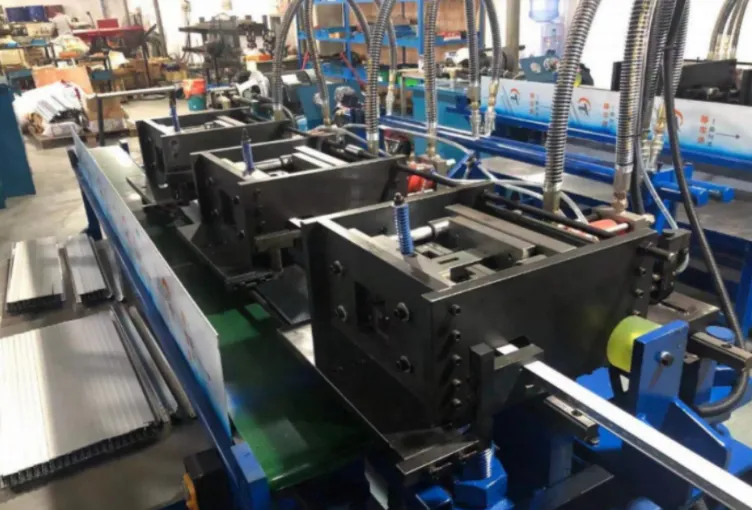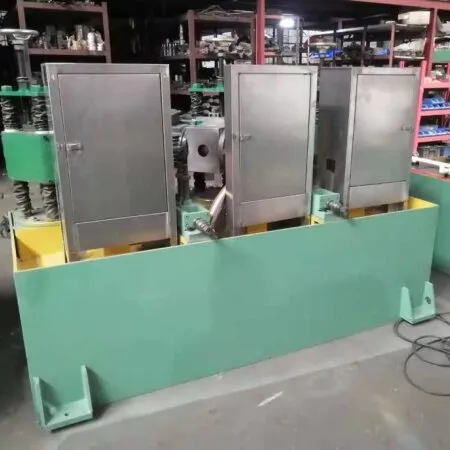Affordable Pipe Manufacturing Machine Prices Best PVC Options
- Factors influencing equipment investment in pipe production
- Technical advancements in modern extrusion systems
- Market analysis of PVC machinery and cost structures
- Comparative evaluation of global equipment providers
- Customized solutions for specific manufacturing requirements
- Industry-specific implementation case studies
- Strategic procurement considerations for maximum ROI

(pipe manufacturing machine price)
Understanding Investment Factors in Pipe Production Equipment
The cost spectrum for pipe manufacturing equipment varies considerably, typically ranging from $50,000 for basic single-layer extrusion systems to over $500,000 for fully automated production lines with multi-layer capabilities. Four primary elements dictate pricing structures: production capacity requirements (with outputs from 100kg/hr to 1,000kg/hr), material versatility (PP, PE, PVC compatibility), automation level (manual operation vs PLC-controlled systems), and auxiliary equipment included. Industry data reveals that operational efficiency improvements of 15-25% through modern automation typically justify the 20-35% higher initial investment within 18-24 months of operation.
Technological Advancements in Modern Extrusion Systems
Contemporary pipe manufacturing machines integrate precision engineering with digital monitoring. Advanced features like co-extrusion heads allowing for triple-layer pipe structures dramatically enhance product durability while reducing material costs by 12-18%. Real-time thickness monitoring systems using laser measurement sensors maintain dimensional accuracy within ±0.05mm tolerance levels. Energy-efficient barrel heating designs reduce power consumption by up to 30% compared to conventional systems, and quick-change tooling setups decrease product changeover time from hours to minutes. The incorporation of IoT-enabled predictive maintenance capabilities further minimizes downtime by 40%.
Market Dynamics of PVC Production Machinery
The global PVC pipe equipment sector reached $1.2 billion in 2023, with projected 5.8% annual growth through 2028. Regional manufacturing hubs significantly impact pricing, with European-designed machines commanding 15-20% premiums over comparable Asian models due to rigorous certification standards (CE, ISO 9001) and extended equipment lifecycles. Mid-capacity PVC lines (200-400kg/hr output) represent the most sought-after category, typically priced between $120,000-$280,000 depending on control system sophistication. Raw material flexibility continues to drive innovation, with dual-capability machines processing both rigid and flexible PVC formulations gaining market share despite 8-12% higher costs.
Supplier Capability Analysis
| Manufacturer | Lead Time | Price Range (USD) | Max Output | Warranty | Technical Support |
|---|---|---|---|---|---|
| EuroExtrusion Systems | 90-120 days | $220k - $480k | 850 kg/hr | 3 years | 24/7 remote monitoring |
| AsiaTech Machinery | 60-75 days | $85k - $180k | 550 kg/hr | 2 years | Business hours support |
| AmeriPipe Solutions | 75-100 days | $150k - $350k | 700 kg/hr | 3 years | On-site within 72 hours |
| GlobalPipeTech | 120-150 days | $300k - $550k | 950 kg/hr | 5 years | Dedicated engineer program |
Customized Manufacturing Solutions
Leading suppliers now offer configuration flexibility to meet specialized production requirements without prohibitive cost increases. Modular designs enable capacity scaling where initial investments of $150,000 can be upgraded to higher outputs with $35,000-$50,000 supplemental investments. Material-specific adaptations include corrosion-resistant barrels for CPVC processing (+12% cost) and dual-screw designs for recycled material incorporation (+15-18% cost). North American manufacturers show particular demand for space-optimized layouts with 30% smaller footprints than standard installations. Suppliers typically charge 8-12% of base equipment costs for comprehensive plant layout engineering and installation supervision services.
Industry-Specific Implementation Cases
A Midwest plumbing products manufacturer achieved 22% operational cost reduction after implementing a $325,000 automated PVC line featuring inline quality scanning. The system paid for itself within 19 months through reduced material waste (-18%) and increased output capacity (+35%). In irrigation systems production, a Californian company recorded 40% energy savings using variable frequency drive extrusion technology with a 2.3-year ROI timeframe. Water infrastructure specialists in Germany documented 50% reduction in thickness variation defects after upgrading to laser-guided extrusion control systems, despite the 15% premium over standard machines.
Strategic Investment Considerations for Pipe Manufacturing Machine Price Evaluation
Beyond the initial pipe manufacturing machine price
, long-term operational economics must guide procurement decisions. Comprehensive lifecycle analysis typically reveals that maintenance and energy costs constitute 60-75% of total ownership expenses over a 10-year horizon. Forward-looking organizations prioritize systems offering future scalability, avoiding equipment with limitations requiring complete replacement for capacity increases. Financing arrangements from reputable suppliers now offer attractive terms including 3-year payment plans with 20% down payment options. The benchmark ROI period for modern pipe manufacturing equipment ranges between 2.5-4 years depending on production volume and product specifications.

(pipe manufacturing machine price)
FAQS on pipe manufacturing machine price
Q: What factors influence pipe manufacturing machine price?
A: Pipe manufacturing machine price depends on production capacity (kg/h), automation level, and included features like cutting or printing systems. Material compatibility (PVC, HDPE, etc.) and energy efficiency standards also impact costs significantly. Customization requests may further affect the final quotation.
Q: How much does a PVC pipe manufacturing machine typically cost?
A: Entry-level PVC pipe machines start around $20,000-$50,000 for basic models. Mid-range systems with automation cost $70,000-$150,000, while high-capacity turnkey solutions can exceed $300,000. Final pricing varies based on pipe diameter range and configuration complexity.
Q: Where can I find reliable PVC pipe manufacturing machine suppliers?
A: Established PVC pipe machine suppliers include global manufacturers like Battenfeld-Cincinnati, KraussMaffei, and Chinese brands like Zhangjiagang Tairong Machinery. Industry exhibitions like K Trade Fair and direct factory visits help verify supplier credibility and production capabilities before purchasing.
Q: Why is there such a wide price range for PVC pipe extruders?
A: Pricing variations reflect differences in throughput capacity (2,000kg/h vs. 10,000kg/h machines), automation technology (manual vs. PLC-controlled), and material efficiency. Additional components like vacuum tanks, haul-offs, or dual extruders significantly increase costs compared to basic setups.
Q: How do I evaluate PVC pipe machine suppliers beyond price?
A: Assess suppliers through their equipment warranty terms (preferably 2+ years), spare parts availability, and technical support responsiveness. Request client references from your region to verify installation expertise and after-sales service quality before finalizing orders.
